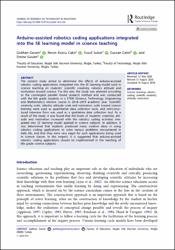Arduino-assisted robotics coding applications integrated into the 5E learning model in science teaching
Abstract
The present study aimed to determine the effects of arduino-assisted robotics coding applications integrated into the 5E learning model used in science teaching on students' scientific creativity, robotics attitude and motivation toward science. For this aim, the study was planned according to the convergent parallel mixed research method and was conducted with the 6th grade students in a STEM (Science, Technology, Engineering and Mathematics) elective course in 2018–2019 academic year. Scientific creativity scale, robotics attitude scale and motivation scale toward science learning were used as quantitative data collection tools, and semi-structured interview form was used as a qualitative data collection tool. As a result of the study, it was found that the levels of students' creativity, attitude and motivation increased with the robotics coding activities integrated into 5E learning model applied in science subjects. In addition, it was determined that students produced many creative ideas in using robotics coding applications to solve various problems encountered in daily life, and that they were very eager for such applications being used in science classes. In this respect, it is suggested that arduino-assisted robotics coding applications should be implemented in the teaching of 6th grade science subjects. © 2020 ISTE.


















